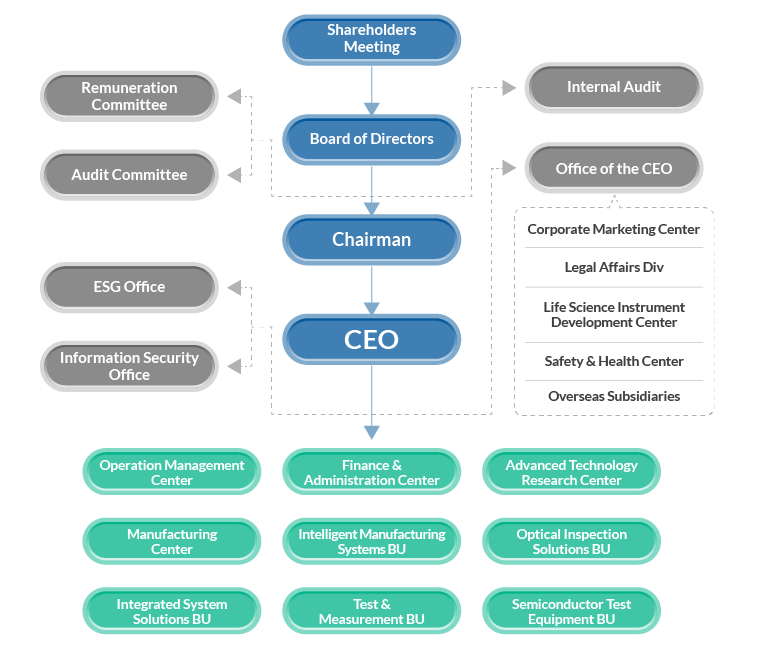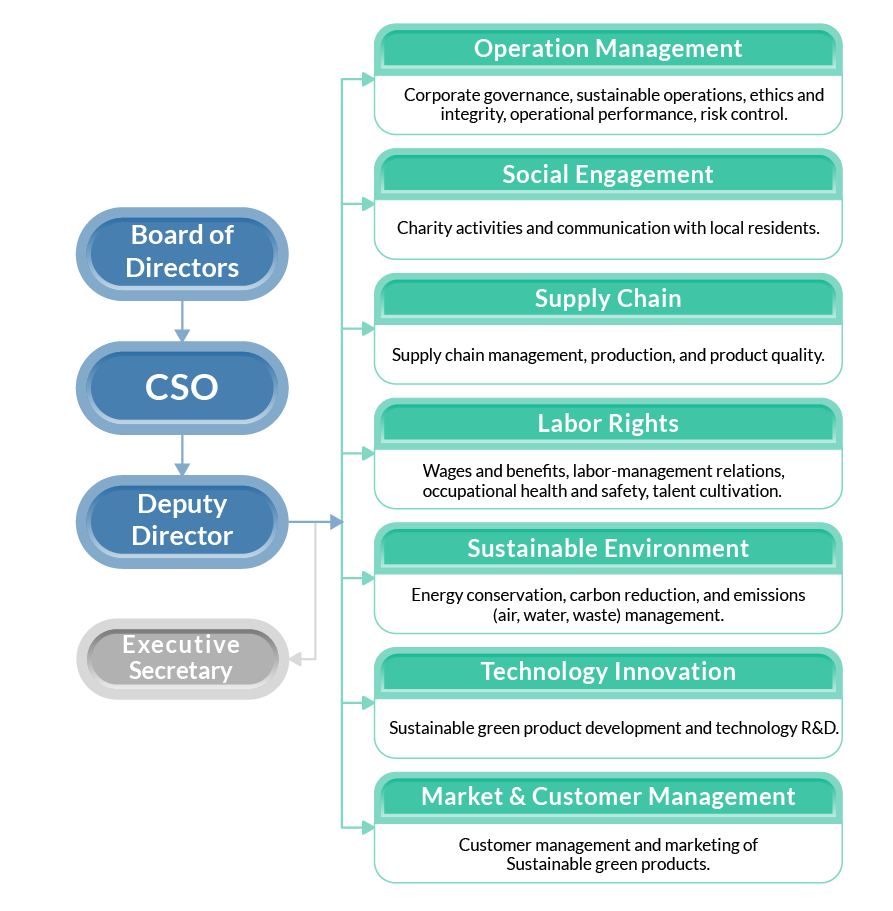Corporate Governance
Sustainability Governance

Company organizational structure
The shareholder meeting serves as the highest body of authority for Chroma, and the Board of Directors led by the Chairperson assumes responsibility for implementation and supervision of the various operations of the Company. In an effort to improve overall operational efficacy and decision-making power of the Chroma Group, the Chairperson is also serving as the CEO of Chroma. To strengthen the independence of the Board of Directors, all current senior executives are locally (Taiwan) hired employees.

ESG Office
In 2022, in an effort to fulfill our corporate social responsibilities and stay true to our philosophy for sustainable operations, the Board of Directors approved the establishment of the Chroma Foundation, the Chroma ESG Office, and the Chroma ESG Working Groups. The aim being to practice sustainable development in terms of the following seven aspects: corporate governance, products and innovation, a happy workplace, social engagement, a sustainable environment, suppliers and partners, and climate change. Additionally, the United Nations Sustainable Development Goals (SDGs) were adopted as the direction for implementing sustainable strategies. The performance results of ESG KPIs were reported to the Board in the Q4 board meeting.

Board of Directors Operations
The shareholders’ meeting is the highest authority of the Company. The Board of Directors, led by the Chairperson who serves as the Chair, executes and supervises the Company’s various businesses. The Chairperson also concurrently serves as the CEO to enhance the overall operational efficiency and decision-making effectiveness of the Group. The Chairperson maintains full communication with all directors regarding the Company’s operational status and business performance to implement corporate governance practices. To strengthen the independence of the Board of Directors, the Board consists of 9 directors, including 4 independent directors. The term of office for directors is 3 years, and they may be re-elected. The term of the current Board runs from June 9, 2023, to June 8, 2026. The Company adopts a candidate nomination system for the election of directors, with shareholders electing directors from the list of nominated candidates. The nomination procedures and required compliance matters are conducted in accordance with the Company Act and the Securities and Exchange Act and related regulations.
In 2024, the Board of Directors convened 4 meetings, responsible for reviewing and supervising major decision-making on economic, social, and environmental issues of the Company, to maximize shareholder interests. In addition, if any director has a conflict of interest regarding a meeting matter that involves themselves or the legal person they represent, they must disclose the material details of the conflict of interest at the Board meeting. If there is a likelihood of harming the Company’s interests, they must refrain from participating in the discussion and voting on the matter, and they must also recuse themselves from acting as a proxy to exercise voting rights on behalf of other directors. To enhance the Company’s focus on climate change issues, the Board of Directors appointed a director-level person responsible for climate change issues, who supervises the Company’s climate change strategy and targets, manages climate change risk and opportunity actions, and monitors the implementation status of sustainability goals. The Company’s ESG Office reported on the sustainability operations and outcomes to the Board of Directors on April 30 and October 31, 2024.
Board Independence and Diversity
When determining the composition of the Board of Directors, the Company considers board diversity from multiple aspects, including but not limited to gender, age, cultural and educational background, ethnicity, professional experience, skills, knowledge, and tenure of service. In 2024, the Board of Directors consisted of 9 members, all of whom were of local nationality, including 4 independent directors, accounting for 44%. None of the independent directors had served more than three terms, and each had a different professional background, ensuring full independence. The current Board includes one female independent director. Members’ ages range from 40 to 80 years old, and the Board is professionally diverse. Each director has many years of practical business management experience and possesses business judgment, crisis management capabilities, industry knowledge, an international market perspectives, leadership, and decision-making abilities.
In accordance with listing company regulations, the Company has obtained a written statement from each independent director confirming their qualifications and their own and their immediate family members’ independence from the Company, with no violations of the Securities and Exchange Act. The Chief Corporate Governance Officer reports annually to the Board of Directors on the results of reviewing the qualifications of independent directors during their terms of office.
Remuneration policy for directors and senior executives
Directors:
In accordance with Article 34 of the Company's Articles of Incorporation, up to 1.5% of the Company's pretax earnings (prior to the distribution of employee compensation and director compensation) may be allocated as director compensation. The director remuneration policy considers the Company's overall operational performance, future industry risks and development trends, and individual contributions to the Company's performance to provide reasonable compensation. Director remuneration is reviewed by the Remuneration Committee and the Board of Directors, and the compensation system is reviewed as needed based on actual operating conditions to achieve a balance between sustainable operation and risk control.Managers:
The Company has established a "Senior Manager Remuneration Management Policy." Upon appointment, managers' fixed monthly salary is determined with reference to compensation levels for similar positions in the industry. The variable portion consists of employee compensation, which is proposed based on the year's business performance and individual performance evaluation and submitted to the Remuneration Committee for review and approval by the Board of Directors.
Board performance evaluation
To implement corporate governance and enhance the functionality and operational efficiency of the Board of Directors, the Company has established the "Board Performance Evaluation Policy," which stipulates that the Board shall conduct at least one performance evaluation each year for the Board of Directors, its members, and each functional committee. Evaluation aspects include: participation in Company operations, enhancement of Board decision-making quality, Board composition and structure, director selection and ongoing training, and internal control. The Company's Board performance evaluation must be conducted by an external professional independent organization or an external team of experts or scholars at least once every three years. An annual performance evaluation must also be conducted at the end of each fiscal year.
The results of the 2024 Board performance self-evaluation, Board member performance self-evaluation, functional committee (including Remuneration Committee and Audit Committee) self-evaluation, and the once-every-three-years external organization evaluation are detailed as Chroma Website.
Board Continuing Education
In accordance with the requirements of the Guidelines for the Implementation of Training for Directors and Supervisors of Listed and OTC Companies, new appointees should receive at least 12 hours of training during their first year of appointment and at least 6 hours of training annually thereafter.
In 2024, the total Board training amounted to 69 hours, with an average of 7.7 hours per director, exceeding the regulatory recommendation of 6 hours. In the future, the Company will continue to arrange a diverse range of external training courses to further enhance directors’ professionalism, fulfill their duty of loyalty and the duty of care of a prudent manager, and fully exercise their decision-making and leadership supervision functions.
Ethical corporate management

0 incidents of unethical conduct or corruption in 2024
Ethical transactions have always been a core part of the Company’s business philosophy. We are always committed to conducting all business activities with integrity and do not tolerate corruption or any form of fraudulent behavior. Since its establishment, Chroma has always regarded "integrity" as a primary employee behavioral guideline and a core value. We have established and published relevant internal regulations, including the "Ethical Corporate Management Best Practice Principles," "Chroma Ethical Corporate Management Operating Procedures," and "Code of Ethical Conduct." To provide employees with clear behavioral guidelines and a system of rewards and penalties, the Company’s "Employee Incentive Management Procedure" specify guidelines for commendable and punishable behavior, penalties for violations, and channels for anonymous individual complaints, serving as an internal and external channel for submitting statements. Any reported matters are handled by a designated responsible unit. Employees are required to comply with relevant laws and internal regulations. Through extensive promotion of loyalty and integrity values, we aim to enhance a positive corporate culture.
When Chroma identifies that it has violated ethical corporate conduct and caused or contributed to negative impacts, the Company shall implement clear and concrete remedial measures to fulfill its responsibility to stakeholders. First, based on the severity of the impact caused by the incident, we will provide or cooperate with relevant parties to implement remedial actions, such as apologizing to victims, providing financial or non-financial compensation, committing to prevent similar incidents in the future, or legally accepting penalties, such as fines or administrative sanctions. Chroma will establish comprehensive procedures based on the nature of the impact to enable affected stakeholders to participate in the design, review, and improvement of the grievance mechanism, ensuring the procedures are fair, transparent, and aligned with actual needs and cultural context. To ensure these mechanisms are effectively implemented, the responsible unit shall continuously track their operational effectiveness and evaluate them using quantitative and qualitative indicators.
We will promptly investigate any violations and take action to mitigate negative human rights impacts. When necessary, an investigation team will be formed to handle the matter appropriately. Chroma will not tolerate retaliation against anyone who, in good faith, reports violations of laws, conduct standards, or other Company policies.
In addition to conveying and reiterating the importance of integrity, we have also established processes designed to prevent acts of dishonesty in the “Chroma Rules on Ethical Management Best Practice”. In addition, we also ask collaborating partners to sign a “Letter Undertaking Integrity”, which clearly states that the undersigned party pledges to refrain from transactions that would be deemed inappropriate or unethical in all business activities and that Chroma may immediately terminate all business dealings with an undersigned party in the event of violation. Terms on integrity and ethical practices have also been included in the Chroma standard Sales and Purchase contracts to deter any acts of dishonesty. There were no incidents of unethical conduct or corruption in 2024 and all employee behavior was in strict compliance with all the pertinent regulations for ethical conduct and true to the Chroma ethical management philosophy. In 2024, a total of 1,622 participants completed the “Corporate Integrity and Code of Ethics” course through the new system. The course, delivered via two videos and a knowledge-based Q&A, aimed to help employees understand the importance of integrity and ethical conduct in both daily life and the workplace.
Legal compliance

0 incidents of violations of laws or regulations resulting in penalties in 2024.
Strict compliance with laws and regulations in operations is an exercise of social responsibility and one of the keys to sustainable management. Chroma’s products and services are available worldwide. To ensure compliance with relevant global laws and regulations, Chroma has established a legal department that closely monitors the formulation and development of regulations that may affect the Company, and has implemented a system for assessing compliance with laws, policies, and regulations to assist various departments in adhering to all applicable standards. The Company identifies and manages laws and regulations related to operations, environmental protection, occupational safety and health, labor, and products, implements legal monitoring, and discloses any fines imposed due to administrative legal cases or major incidents that significantly affect Company operations in the Corporate Social Responsibility Report, to achieve balanced reporting and information transparency.

